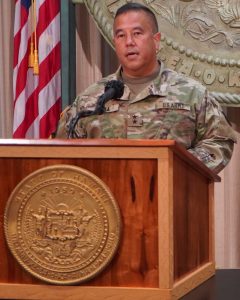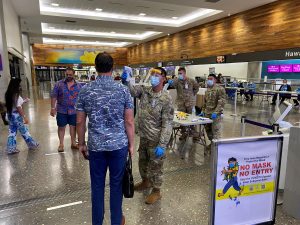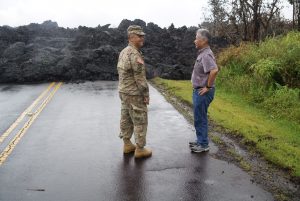The incident commander: A career handling crisis
Posted on Oct 3, 2022 in Capitol Connection, Featured, MainMaj. Gen. Kenneth Hara has spent 38 years handling disaster response for Hawai‘i, but he said COVID-19 has been “the hardest and most challenging of my career.” Hara wears several hats — as adjutant general and commander of the Hawai‘i Army and Air National Guard; director of the Hawai‘i Emergency Management Agency; and as director of the Hawai‘i Office of Homeland Security. He was appointed incident commander in March 2020 for COVID-19, which meant helping to coordinate multiple elements of prevention, detection, containment and treatment of the disease, in partnership with the Department of Health and numerous other agencies.
Q. What made responding to COVID-19 so challenging? “I’d have to say it was the duration and all the unknowns. All the other disasters I’ve handled — floods, tsunamis, earthquakes, landslides — we knew what needed to be done. But with COVID, things were changing so fast, my role was to ensure that everyone was aligned to the state’s priorities. We launched the largest and longest support mission in Hawai‘i National Guard history, involving 1,800 service members. We administered 24,000 COVID-19 swab tests, provided screenings at airports, transported thousands of pounds of cargo, did contact tracing, and distributed food and free PPE. From March to October 2020, myself and our executive team actually lived at the Diamond Head HI-EMA headquarters.”
Q. What has it been like working with the governor during COVID-19 and these multiple crises? “It was clear Governor Ige was in charge. He’s a calm person in the most challenging times. I think that calming effect carried over to everyone else who supported the state. The governor is definitely decisive, but he’s methodical and thoughtful in the process. Those people who try to second-guess leadership — they’re not there to hear the discussion and don’t understand the complexities of the decisions we have to make. If we were constantly changing policies — knee-jerking under the guise of decisiveness — it would create more confusion.”
Q. What have we learned from these multiple disasters, including COVID-19? “We’ve got to plan for the worst-case scenario and can’t assume it’s not going to happen. What’s challenging, though, is how to mitigate things before a disaster happens. For example, suppose we adjust building codes to make our buildings more resilient to hurricanes and flooding, in anticipation of climate change. People will say it drives up the cost of construction. It’s the right thing to do, but we won’t get there unless more people push for change.”


